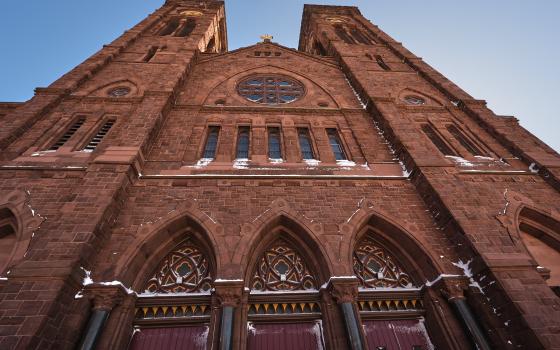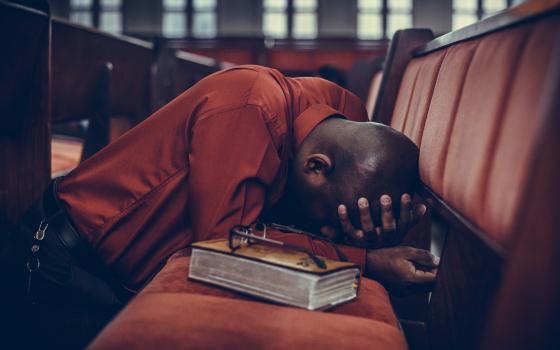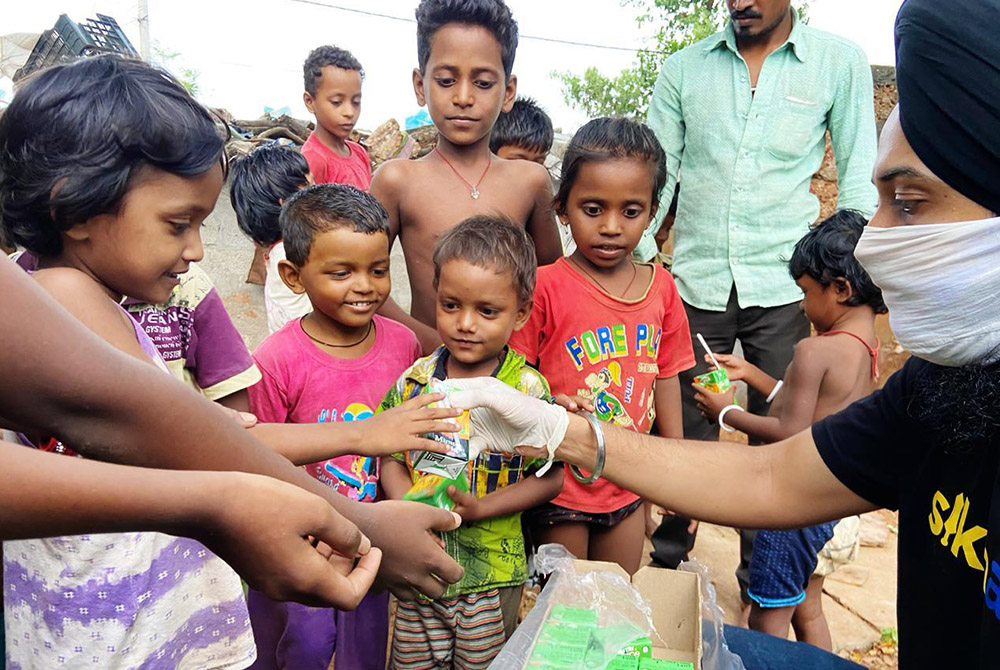
A member of SikhAid shares food with people on the street. (Courtesy of the SikhAid Youth Group)
India continues to grapple with the second wave of COVID-19: hospitals are running out of beds, patients are running out of oxygen and people are running out of hope. As of June 11, within the previous 24 hours India had reported 94,052 daily new COVID-19 cases with 6,148 deaths. An epidemiologist told India Today in April that the actual cases in India could be 5 to 10 times higher than the reported tally.
Live Law reported June 1 that 1,742 children had become orphans, and 7,464 had lost one parent due to the pandemic, according to the National Commission for Protection of Child Rights. We are horrified to see cases of serious post-COVID-19 complications rise in the country; people started panicking when a deadly rare black fungus started killing hundreds of COVID-19 survivors.
At least 244 doctors have died of COVID-19 in India during the second wave, and doctors and medical personnel are living in temporary homes. They only visit their families on video calls. There is ineffable pain among women doctors — mothers unable to hold their children for months.
According to Vatican News, the church has lost over 400 priests and nuns in the pandemic. Many of them were working in remote areas.
With factories, companies and major establishments closed for months, the poor, migrant workers, daily wage-earners, and lower-middle-class people with meager incomes are facing the brunt of the coronavirus.
Apart from the cruelty of the virus, the government's complacency and lukewarm attitude in responding is distressing.
So, apart from the medical frontline workers, who else effectively combats the pandemic in India?
Among the many unseen warriors, I think, the Sikh community turned out to be the good Samaritans to everyone in the country. Here are some examples.
As early as April, I found a poster on social media that read: "Please contact us for free oxygen can, oximeter, masks, and other medical assistance." A week later, I saw another with contact numbers, "free meals for home-quarantine COVID patients." I telephoned to confirm the news!
Satbir Singh, the trustee* of SikhAid Charitable Trust in Bhubaneswar, Odisha (eastern India), was at the other end. He confirmed the information quickly, and politely told me he would drop by our house with information or any help needed. I was pleasantly surprised.
I posted the poster to all my personal WhatsApp groups. "It is authentic. Please pass it on," I added. I also shared with SikhAid some addresses of those needing urgent help and cooked meals. I was pleased to get calls from the beneficiaries about how they received free, healthy, tasty cooked meals.
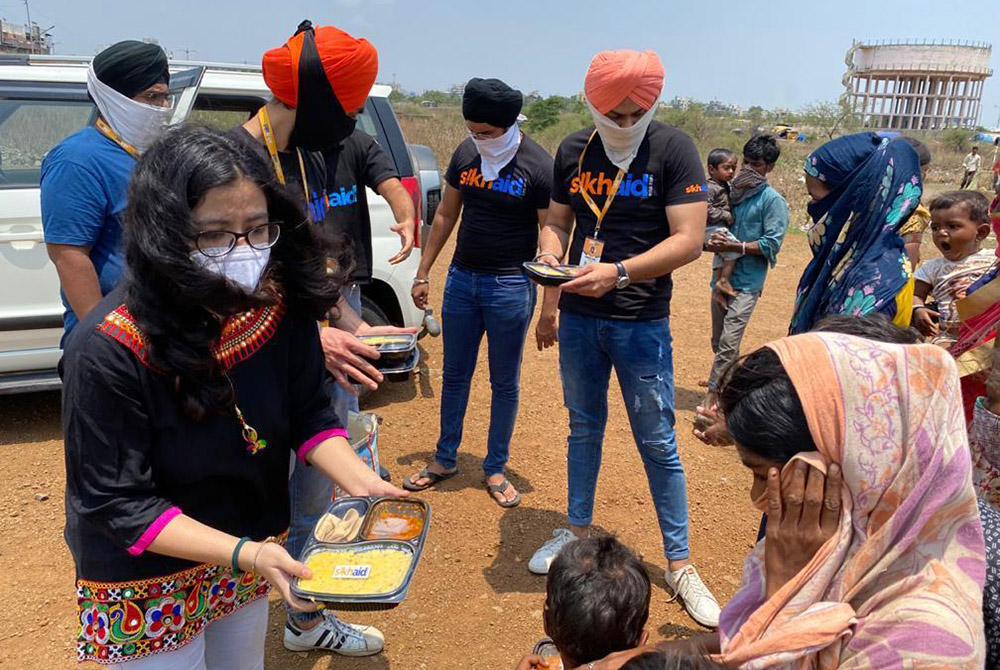
Members of SikhAid distribute cooked meals to those in need in Pune, India. (Courtesy of SikhAid Youth Group)
Since March of this year, when the country saw a resurgence of the deadly virus, Singh — along with his young volunteers. — launched a free oxygen drive. "We get calls at midnight when patients' oxygen saturation drops. Our volunteers are ever ready to reach," said Singh.
They have hundreds of volunteers in different cities. As many as 25 volunteers work in Cuttack-Bhubaneswar, the twin cities in Odisha. "On an average, we get 400-500 calls daily. Out of that 70-80% are critical patients who need oxygen immediately," he added.
The members of SikhAid are students and businessmen, all in the age group of 25 to 35. The volunteers stay in a temporary place to protect their families from getting infections. They provide oxygen cylinders, pulse oximeters, masks and other medical assistance to COVID-19 patients and frontline workers who need it, free of cost.
The Sikh community is driven by Guru Nanak's three main pillars of teachings: Naam Japo (pray to God), Kirat Karo (help others) and Vand Chhako (share 10% of one's earning) as sewa (service).
The organization began in March 2020 when the pandemic affected India. "First, we thought of helping people who were on the street. Gradually we extended our help to six to seven districts of rural Odisha," said Rounak Singh, the founder* of SikhAid.
They sanitized temples, churches, gurdwaras (places of Sikh worship), orphanages, and leprosy colonies. In Bhubaneswar, the capital of Odisha, they also sanitized the Pro-Cathedral church, archbishop's house, and Missionaries of Charity nuns' (Mother Teresa's) home for children, the abandoned and disabled.
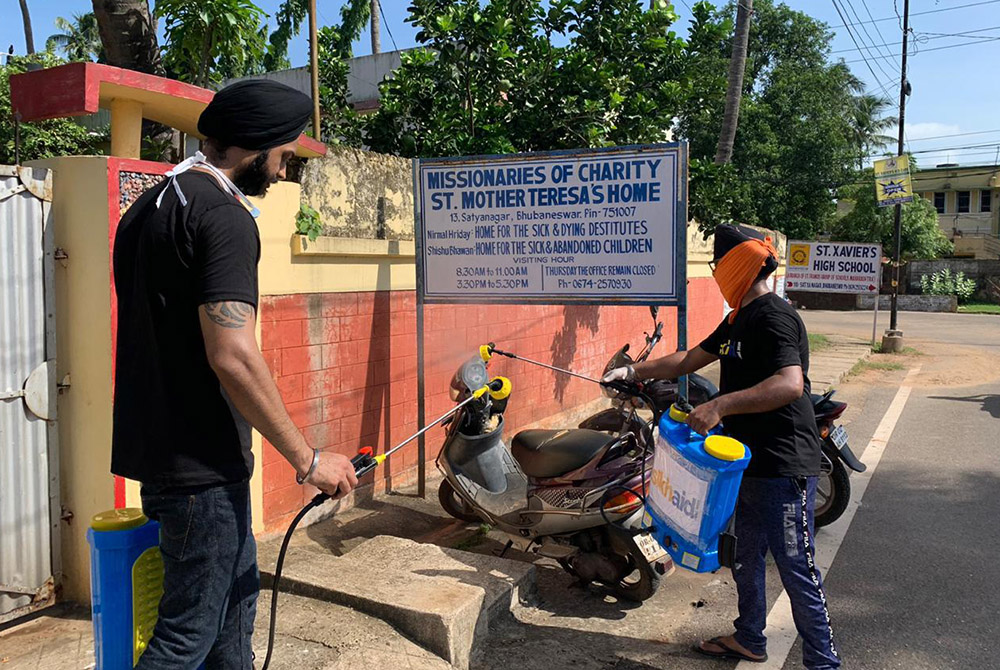
Members of SikhAid sanitize the campus of the Missionaries of Charity and Mother Teresa's home for children and the destitute. (Courtesy of the SikhAid Youth Group)
When cyclones hit the state during the COVID-19 disaster in two consecutive years, SikhAid reached out to victims with bread, butter, milk sachets, sugar, beaten rice, biscuits, mosquito coils, matches and candle packets.
The Sikh youth started their organization/voluntary group with only 25,000 Indian rupees (about $400) but they continue to gather resources from their families, friends and benefactors. Sikh youth provided blankets, pillows, footwear, cooked meals and fruit juice to street people during the pandemic.
The Sikh community has shown their sewa around the country, throughout history. Whenever there has been a need, they intervened in the lives of people, neutrally and for all, regardless of situation.
Express News Service, noting the national capital's struggle "to provide beds, oxygen, medicine and other facilities to corona[virus] positive patients," reported that the Delhi Sikh Gurudwara Management Committee opened a free COVID-19 care center this year, a 400-bed facility. The committee opened the center in just 10 days, a job the government was unable to do.
When people cannot afford an ambulance, the Sikh group is there to transport patients to and from hospitals. They also helped the families perform the last rites for their relatives' bodies.
And the Sikh diaspora abroad reaches out to those in need with selfless service. As reported last year, amid the pandemic a New York-based global nonprofit called United Sikhs started a hotline to help the needy.
In other activities, Sikh farmers have been sitting in protest for months, demanding the repeal of draconian farm laws in and around Delhi, but the government is not sympathetic to their just demands.
Rather, the federal government in New Delhi, India's capital, said they were terrorists possessing AK-47 guns. Tear gas and water cannons were used in the biting winter cold to disperse them. Cases were filed against them in the Supreme Court of India calling them "Khalistanis," (a Sikh separatist movement seeking to create a Sikh homeland).
The noble spirit of service manifested by the Sikhs has justly earned global praise, and we need to take a sympathetic look at their community.
Advertisement
Christians in India have also risen to the occasion and extended helping hands as good Samaritans. In seven states, the Catholic Bishops' Conference of India's Office for Health set up home health programs for COVID-19 patients.
Church-run hospitals, spiritual centers, religious places, and facilities in many states opened their doors to help ease India's COVID-19 burden. Clinics and dispensaries managed by sisters are used as vaccination centers. Global Sisters Report just posted a story about the Carmelite sisters in Gujurat taking care of COVID-19 patients in a makeshift outdoor clinic.
The Kolkata, Varanasi, Bangalore units of the Conference of Religious in India have developed a strategic plan and moved into action to help fight the virus in the states.
The pandemic has seen Indians from all faiths and ethnicities — Hindus, Sikhs, Muslims, Christians, and those without a religious faith — coming together to save lives, driven by sheer humanity in the face of a massive failure of government to address the second wave. And Indian civil society groups, public-spirited individuals, and organizations have been playing a significant role since the beginning of the battle against COVID-19.
As Pope Francis says, our faith enables us to reach out to others. Unless we open ourselves to this kind of encounter, we remain mere spectators. May these tribes increase forever!
*An earlier version of this column gave incorrect titles.





